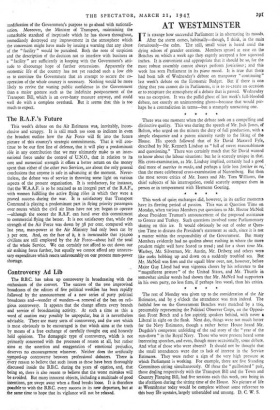The R.A.F.'s Future
This week's debate on the Air Estimates was, inevitably, incon- clusive and scrappy. It is still much too soon to indicate in even the broadest outline how the Air Force will fit into the future picture of this country's strategic commitments. That it will con- tinue to be, our first line of defence, that it will play a predominant role in any contribution that we may ultimately make to an inter- national force under the control of U.N.O., that in relation to its cost and numerical strength it offers a better return on the money spent than either of the other two Services, are about the only general conclusions that anyone is safe in advancing at the moment. Never- theless, the debate was of service in throwing some light on various aspects of the present organisation. It is satisfactory, for instance, that the W.A.A.F. is to be retained as an integral part of the RAF., with women fulfilling the active flying roles in which they were a proved success during the war. It is satisfactory that Transport Command is playing a predominant part in flying priority passengers over routes which the civil air lines have not yet begun to operate —although the sooner the R.A.F. can hand over this commitment to commercial flying the better. It is not satisfactory that, while the strength of the Air Force was down by 38 per cent. compared with last year, man-power at the Air Ministry had only been cut by 3 per cent. And, on the face of it, it is inexcusable that 150,000 civilians are still employed by the Air Force—about half the total of the whole Service. We can certainly not afford to cut down our air striking force further, but equally we cannot afford any unneces- sary expenditure which reacts unfavourably on our present man-power shortage.


































 Previous page
Previous page